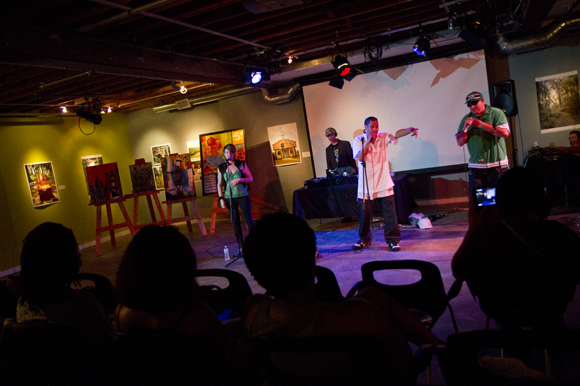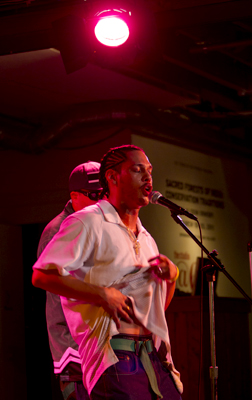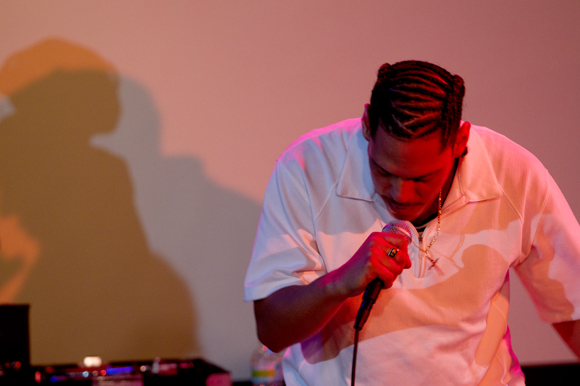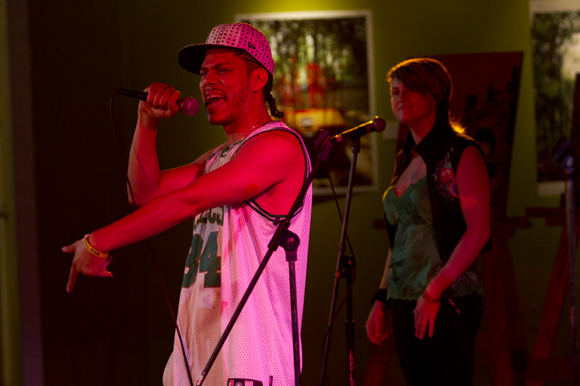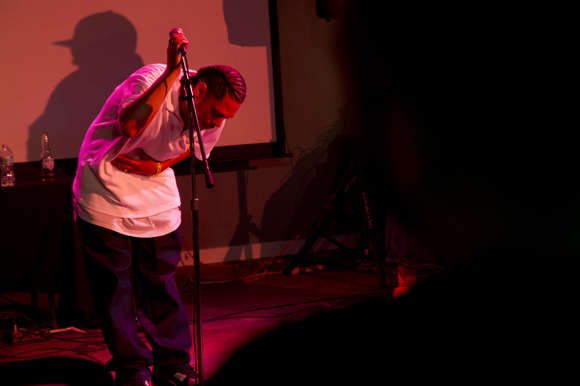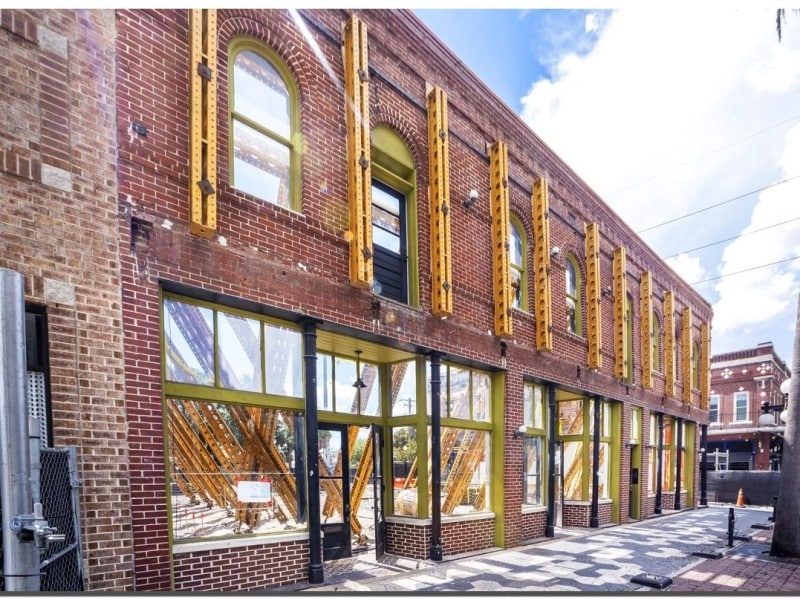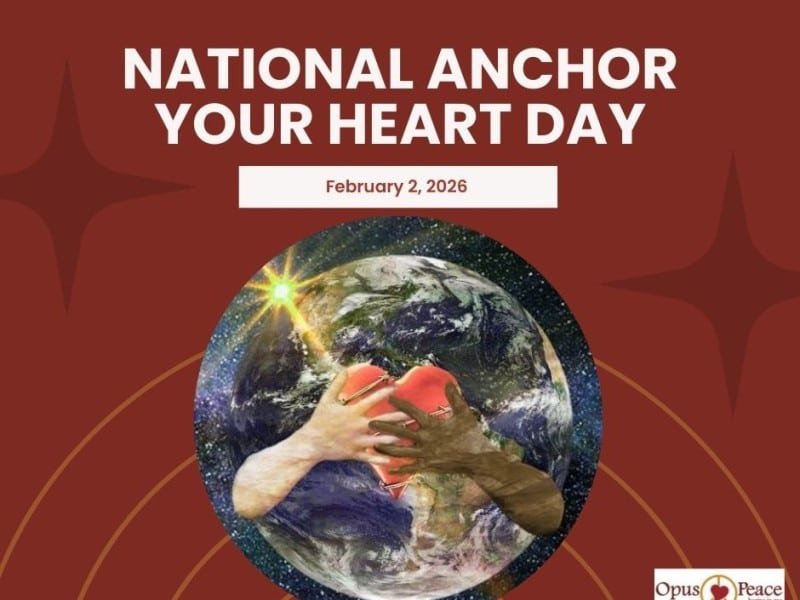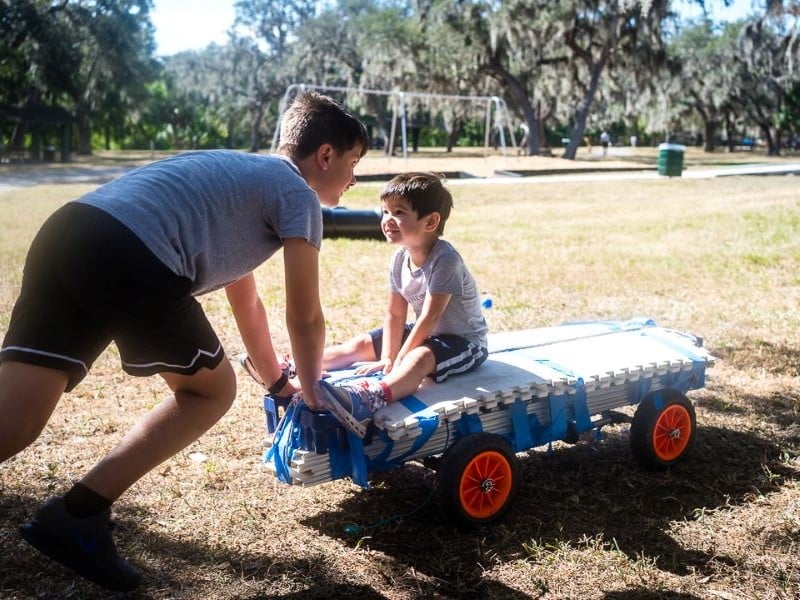Pedro el Poeta: St. Pete’s Spoken Word Street Reporter
Pedro Jarquin is a guy with many talents. The St. Pete-by-way-of-Nicaragua-based musician has cultivated a community of conscious-minded hip-hop and spoken word poets for the last 10 years while simultaneously lifting up his fellow artists. His latest effort, “The Street Reporter EP,” further cements his spot as one of the most exciting performers in the Tampa Bay hip-hop scene. Meet the man the locals call “el Poeta.”
Impactful. Sincere. Jaw-dropping. These are words Sarah Weatherbee uses to describe the art of her husband, St. Petersburg-based musician and spoken word poet Pedro “el Poeta” Jarquin. Rap music’s toughest critics would likely balk at these descriptions, except this isn’t your typical artist.
“He motivates other artists to be better at what they do,” she says. “He’s so bold and he owns it. We all want to fully embrace our artwork like that.”
Jarquin’s latest release, “The Street Reporter EP,” represents a style of hip-hop that prefers conscious to crass. In “State of Emergency,” he puts the government on trial and laments last summer’s disastrous Gulf Coast oil spill over a backing track of distorted guitars, horn-snippets and a fuzzy bass line. The somber, piano-laced “Missing Pieces” recounts the grisly murder of 19-year-old D.C. graffiti artist Alfredo Tello.
All stories that hit close to home and echo the type of storytelling that captivated Pedro Jarquin at a young age.
“Hip-hop started out capturing its culture — it’s my generation’s folk music,” he says.
Prior to coming to America, Jarquin lived in Managua, Nicaragua, where he was born and raised until the age of 6.
“No one locked their doors when I was little,” he recalls. “Before all the tension of the war, the people were still very open, welcoming and humble.”
When deported criminals from the U.S. began creating gangs and recruiting soldiers during the Contra War, the mood began to shift, according to Jarquin.
His father fled to the United States in fear of recruitment. A year later, he had earned enough money to get Jarquin and his mother out of Nicaragua.
During their arduous journey to the states, they battled hunger, hiked for hundreds of miles, traveled in the luggage compartments of buses and spent two months in a Mexican jail. After nine months of traveling, they finally arrived to the U.S. and settled down with family in Rockville, MD.
Jarquin gradually adapted to American culture — starting with an introduction by his 14-year-old cousin to the music of Bone Thugs N’ Harmony, Tupac and Dr. Dre. It was unlike anything he’d heard in his life.
Jarquin’s world in Managua was filled with the sounds of Mariachi, Meringue, Cumbia, Bachata and Salsa music. But there was something about hip-hop — the dynamic combination of rhythm and bass — that invigorated him.
“It made me want to bob my head up and down and get grimy,” he says.
He began picking up words in English, eager to comprehend what these artists were saying. Within six months, he was taken out of English for Speakers of Other Languages (ESOL) and put into standard classes.
“The teacher said I was trying to get an easy A,” he recalls.
Finding His Way
A love for hip-hop morphed into a love of theater at Eastern Middle School in Silver Springs. But by his freshman year at Springbrook High School, Jarquin considered dropping out.
“My parents never got past seventh grade,” he says, “so, I figured I’d made all of my achievements by then.”
After catching a talent assembly from his school’s Hispanic group, he realized his calling. He was promised a spot in the assembly his sophomore year and became a driving force of the community event. He performed original raps, choreographed dances, wrote poems and directed skits.
The group’s leader, Spanish teacher Ian Bain, saw Jarquin’s promise immediately.
“He took a leadership role early on and we all realized he had great ability with words, written and spoken,” Bain says.
Jarquin’s desire to create was infectious. The show ran three hours his first year and drew more than 2,000 people from the community.
“Students like Pedro played a big part in bringing national pride to these kids who were struggling to adapt,” Bain says. “Once kids saw the assemblies, they flocked to us by the time we were finished.”
Jarquin’s desire to elevate his community through art and education followed him to St. Petersburg in 2001, where he studied psychology, Spanish and creative writing at Eckerd College.
Throughout college, he established a Hispanic awareness organization, wrote a bi-weekly column called “A Day In The Life” for the school’s paper, spent six months studying abroad in Galicia, Spain, and nursed his newfound love of spoken word poetry by performing at a myriad of venues across Tampa Bay, places like Cafe Alma, State Theatre and The Palladium, to name a few.
Realizing The Power Of Poetry
Studio@620 co-founder and artistic director David Ellis knew Jarquin was a perfect fit for the space in downtown St. Petersburg after witnessing an in-home performance during a dinner party.
“He blew my mind with the poetry he came up with,” Ellis says. “I was not used to sitting at a dinner table having someone speak so beautifully and powerfully.”
From there, Jarquin’s relationship with Studio@620 flourished. In 2004 he began hosting open mic nights on the last Monday of the month, attracting talent ranging from kids in their pre-teens to grandmothers in their 90s.
Weatherbee, a poet, singer, glassblower, science teacher and mother of two, speaks fondly of the events, particularly because it was there she began to realize the power of poetry.
“It wasn’t just a venue,” she recalls. “It made the artist feel like they could really share their art.”
In response to the event’s rising popularity, Studio@620 — with help from Jarquin — began a spoken word festival in 2005 titled “Say What?” Over the course of its three-year-run, the festival featured appearances from acclaimed poet and St. Petersburg resident Peter Meinke, comedian Ranney, musician Oluyemi Thomas, Native American philosopher Gabriel Horn and the Charlotte, N.C. Slam Team.
These events also gave Jarquin the opportunity to experiment with local artists through various collaborations. He formed Purple Bubble, the “world’s first spoken word poetry boy band,” with classically trained singer and poet Jeffrey James. The duo also established a collective of contemporary artists called Nation of Poetry which included people like Weatherbee, Aleshea Harris, Venus Jones and David William Durney.
Upon his graduation from Eckerd in 2006, Jarquin continued to give back to the community through the Florida Youth Arts Corps. He mentored kids in St. Petersburg and Clearwater on rhymes and rhythm, giving them an opportunity to perform their work in public at the end of a three-month program.
Then came a job teaching language arts at St. Pete’s Oak Park Middle and High School. Although the school had a turnover rate of 2-3 weeks he was eager to make a difference for these “last chance kids.”
On his wife’s advice, Jarquin introduced himself the best way he knew how — by doing a performance.
“I busted out into a poem and they were like, ‘What is that? Who are you?’ ” he recalls.
Sharing Life’s Journey, Building Trust
His unorthodox methods grabbed their attention, but it was his sincerity that earned their trust.
“I grew up in the ‘hood like them,” he says. “I was that kid that almost dropped out of school. I didn’t have money. I still don’t.”
That year, his students produced the highest test scores the school ever received, according to Jarquin. But their strong performance wasn’t enough to keep the school open when the recession hit Pinellas County.
Out of work and disenchanted with the state of the country, Jarquin and Weatherbee decided to raise their first child in San Juan del Sur, Nicaragua. The homecoming reignited Jarguin’s artistic flame. He opened a recording studio for local artists and made friends at radio stations. Locals gave him the nickname “el Poeta.” It was one of the best times of his life, he says.
“I got a whole new sense of fulfillment from my art.”
The change of scenery spurred a creative spark that led to the recording and release of 2009’s Pick Your Poison, a double album of poetry and hip-hop. While visiting friends and family and promoting his latest output in St. Petersburg, Jarquin’s wallet containing his social security and green card was stolen.
Without the proper documentation, Jarquin realized he could no longer travel freely between St. Pete and San Juan del Sur. The family of three decided to leave behind their life in Nicaragua and return to St. Pete.
It hasn’t been easy — Jarquin is currently out of work — but the circumstances have driven him to push his music and his message harder than ever.
“In the past couple of weeks, my writing has been a little more uplifting,” he admits. “I feel like we need that right now — see a little blue sky for a minute. Otherwise, we’re going to stay clouded.”
But like any street reporter, Jarquin knows the harshest subjects are the ones that need to be told the most.
“It makes me think, ‘See, this is why I need to write this song,’ ” he says, “because it didn’t just happen 15 years ago. It’s happening now.”
Matt Spencer, a University of South Florida grad, is a native Floridian who enjoys sharing his love for Patty Griffin, browsing produce stands, spending hours in record shops and gawking at the ice cream selection in grocery stores. Comments? Contact 83 Degrees.

